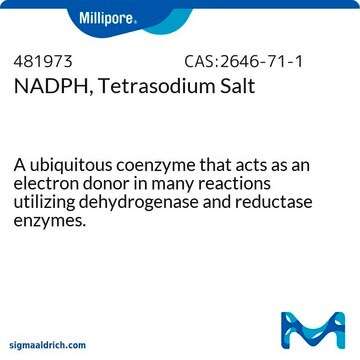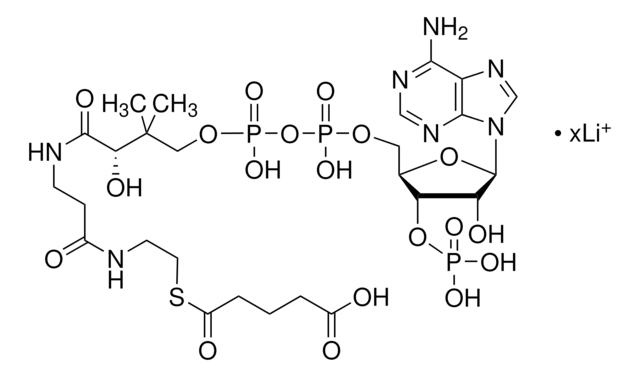H0261
DL-β-Hydroxybutyryl coenzyme A lithium salt
≥90%
Synonym(s):
DL-3- Hydroxybutyryl coenzyme A lithium salt
About This Item
Recommended Products
Assay
≥90%
storage temp.
−20°C
SMILES string
[Li].CC(O)CC(=O)SCCNC(=O)CCNC(=O)C(O)C(C)(C)COP(O)(=O)OP(O)(=O)OCC1OC(C(O)C1OP(O)(O)=O)n2cnc3c(N)ncnc23
InChI
1S/C25H42N7O18P3S.Li.H/c1-13(33)8-16(35)54-7-6-27-15(34)4-5-28-23(38)20(37)25(2,3)10-47-53(44,45)50-52(42,43)46-9-14-19(49-51(39,40)41)18(36)24(48-14)32-12-31-17-21(26)29-11-30-22(17)32;;/h11-14,18-20,24,33,36-37H,4-10H2,1-3H3,(H,27,34)(H,28,38)(H,42,43)(H,44,45)(H2,26,29,30)(H2,39,40,41);;
InChI key
HNPHARRBSFXZAL-UHFFFAOYSA-N
Application
- as a substrate in the HSD17B4 protein enzymatic assay
- as a substrate to determine the specificity and kinetics of Hc-DHS-28 and its mutation proteins
- as a component of the reaction buffer in S-adenosyl-L-homocysteine hydrolase (AHCY) in vitro acylation
Biochem/physiol Actions
Storage Class Code
11 - Combustible Solids
WGK
WGK 3
Flash Point(F)
Not applicable
Flash Point(C)
Not applicable
Personal Protective Equipment
Certificates of Analysis (COA)
Search for Certificates of Analysis (COA) by entering the products Lot/Batch Number. Lot and Batch Numbers can be found on a product’s label following the words ‘Lot’ or ‘Batch’.
Already Own This Product?
Find documentation for the products that you have recently purchased in the Document Library.
Customers Also Viewed
Our team of scientists has experience in all areas of research including Life Science, Material Science, Chemical Synthesis, Chromatography, Analytical and many others.
Contact Technical Service












